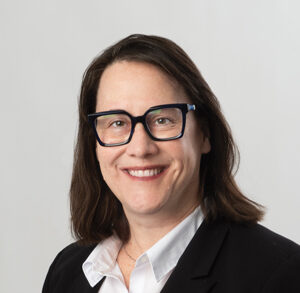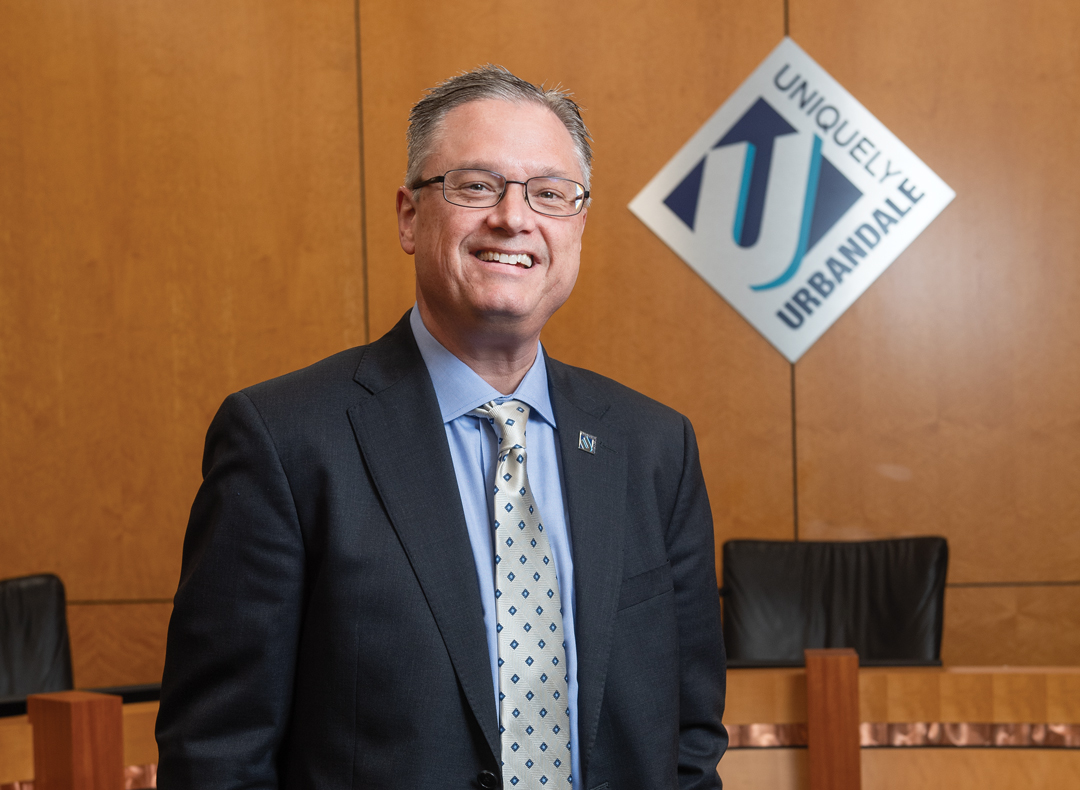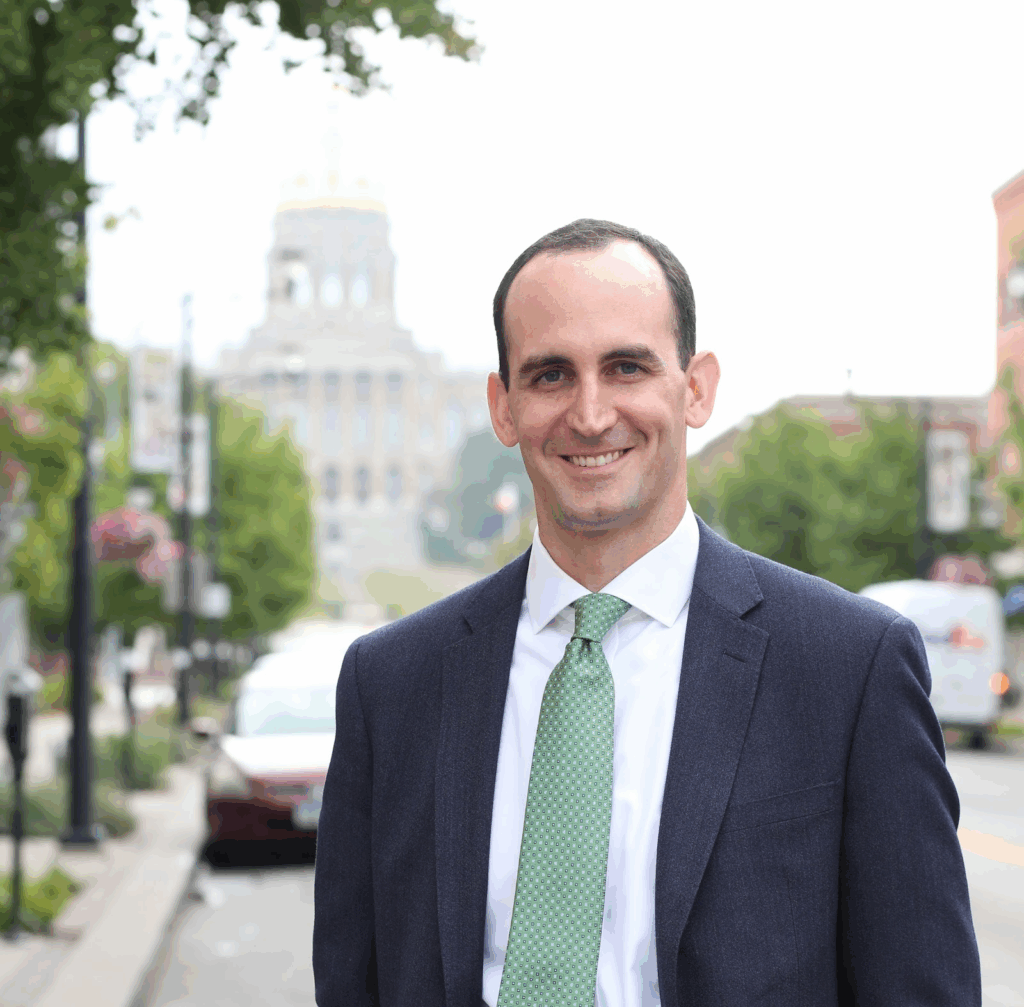A Closer Look: David Jones
City manager, city of Urbandale

Gigi Wood May 16, 2025 | 6:00 am
14 min read time
3,442 wordsA Closer Look, Economic Development, Government Policy and LawDavid Jones started his new position as city manager of the city of Urbandale on Jan. 27, two days after his final day as city manager of the city of Ankeny, a job he held for 11 years. In Ankeny, the city grew by 26,000 residents during his tenure, an increase of 52%. He is credited with helping to lead efforts to build the Albaugh Family Senior Community Center and leading a double bond referendum for a new fire station and library.
As part of one of the fastest growing metros in the Midwest, Ankeny and Urbandale are naturally taking on new residents.
In 2013, Ankeny’s population was 50,000. Today it is 76,027. The suburb north of Des Moines is bordered by Interstate 80 on the south, N.E. 38th Street on the east, Highway 415 on the west and about N.E. 126th Avenue on the north, an area of about 30 square miles.
Urbandale’s population has ticked up 20% from 39,463 in 2013 to 47,495 today.
Sandwiched west of Des Moines, north of West Des Moines and east of Waukee, the city of Urbandale is bordered on the south by Hickman Road, extends east to Merle Hay Road, west to 184th Street and north to 250th Street, an area of about 22 square miles. Urbandale also resides in two counties, Polk and Dallas.
With that growth comes a bevy of new municipal needs, from water to streets, as well as demand for community amenities like parks and playgrounds.
To be part of the conversation about city growth, infrastructure and community projects, it’s important to be in the room when budget talks are taking place. Jones joined Urbandale at a busy time for city administration. The Iowa legislative session is beginning, and talks are usually underway for the upcoming budgets.
“I wanted to get on board in time to impact the budget,” he said.
The Business Record sat down with Jones to talk about his first few months in his new position and about the challenges and goals ahead.
How are you liking your new position?
It’s been great. It’s been a little bit of drinking from a fire hose because of the timing. Starting a new job in Iowa, in October or November through March and April, that timeframe is typically the busiest because of the budget process, capital planning and the legislature being in session for those first few months of the year. So it’s a busy time, but so far, it’s been extremely rewarding.
When you stepped away from your position in Ankeny, people spoke very highly of you. What are some of your thoughts on your time in Ankeny, especially during a time of significant growth?
I think I’m proudest of the teamwork, really. I always appreciate the accolades. And people said a lot of nice things on the way out, but at the end of the day, what was accomplished there I think was a result of incredible teamwork, especially during that first eight or nine years just because of the pace of the work and the pace of the things that we were working on.
Really, as I look back, I just have been incredibly fortunate in my career, in the private sector and in the public. It just seems like the stars have aligned very well for me in terms of the decisions that I’ve made career-wise seem to always be in the right place at the right time. There’s just an incredible amount of luck that’s involved and divine intervention. I do believe that God had a role in the timing of getting a new job, but I look back at that time with a tremendous amount of pride, particularly just in terms of the teamwork, and I was fortunate to be a part of that. But it’s a new day. I tell you, one of the things that really attracted me to Urbandale is just how much planning, how much time and effort and energy they put into planning in so many different ways.
I really believe that the future for Urbandale is incredibly bright, and in so many different ways. That’s the thing about every job I’ve had in the public sector — we’ve been able to get the things done, working the plan that the elected officials have addressed in terms of priorities. I can’t imagine being a part of something that’s got more potential than what we have here in Urbandale, just because there’s so many different things that they worked on and were really well aligned. It’s just a matter of prioritizing and finding the resources to do it. It’s interesting when you’re in a job, private sector or public sector, for so many years, and you change jobs, you don’t really fully understand what you’re getting into until you’ve been in for a few months. I’ve been in this position now long enough to know this was the right move for me at the right time.
You said things here are well aligned. Can you talk a little bit more about that? A lot of communities around Des Moines have pretty robust strategic plans. What makes Urbandale stand out?
I think Urbandale has done all of the nuts and bolts things historically well. What I know about Urbandale from not only being here, but being part of the metro is just how lean in operation it is. In terms of staffing, we have great staff, but it’s a lean staff. In terms of the nuts and bolts, the things that people probably think of the most when they think of city government, we do very well.
At the same time, the city council has really embarked on an aggressive approach over the last few years, and specifically in the last 18 months, we have a brand new comprehensive plan. We have a brand new strategic plan.
We have looked at things like sustainability, so we have an action plan related to that. We have looked at human service needs in the community. We’ve looked at affordable housing.
Before I got here, they really took a look at, “how do we execute?” And as a city manager, one of the things that’s going to be more critical in the next 10 years than has been in the last 10, is we’re going to have to squeeze more out of fewer resources. Our resources are finite. That’s always been the case. But in case you haven’t noticed, from a property tax standpoint, because of legislation, because of the way Iowa does business, cities are limited in the ways that they pay the bills.
The cities that are going to be successful in the next decade are going to be those that have done what Urbandale has done, which is to really examine all the things that are important to them, and to put together plans for action, and then actually go out and work those plans. I think Urbandale is in an enviable position from that standpoint. Very rarely do cities take on so many different high level planning exercises that close together and have brand new plans in all of those different areas.
From a comprehensive planning standpoint, it’s not just that all these plans are in place, it’s what they represent. We’re going to look at things like density, and when people think of density, they probably think of more people in a small area, which is true, but it’s also about tax-based density. It’s about how do we become more sustainable financially? How do we build really high-quality development in the community? How do we redevelop? So again, we’re getting ready to adopt a new Urbandale downtown master plan, so redevelopment will become a heavier focus. When you add all of these things together, they’re setting the roadmap not just for the next few years, but for the next couple of decades, in terms of what Urbandale is going to look like. So that has me energized, and also a little concerned about how much are we going to be able to get done here in the next few years?
What are some of the projects you’re starting with?
Well, take a look at affordable housing, for example. We have the former Motel Relax that’s being redeveloped. We have the EconoLodge that the city purchased, and it’s going to be demolished. In fact, it may be very, very soon. That contract has been led, and that’ll create an opportunity for redevelopment. We’ve got some facilities planning that we need to embark on. Urbandale is a city with tremendous potential for growth, and I think on the inside [city staff and stakeholders], we all know that. But I think sometimes from the outside looking in, maybe people don’t recognize that as much, not only in terms of the population potential that we have and the commercial and industrial opportunities that we have within our existing footprint, but in terms of opportunities moving forward. Now, we’ve got to figure all that out, how aggressive we want to be with annexation, but our comprehensive plan really lays the groundwork for that opportunity to grow.
We’ve got a number of other projects in the queue, but things that are really top of mind are the facilities planning, as our police, for example, are in a very outdated building, and we need to address that. And these are things that I certainly have experience with in positions over the years.
What is your role in this growth and in the future of the city?
I’m the leader of the team, obviously running the day-to-day operations. Part of my job, being brand new, too, will be to come in and look at all the things that we’re doing and the way that we’re doing them. The beautiful thing about Urbandale is it’s been very well covered. It’s been very well managed, so there are no messes to clean up, but there will be opportunities to tweak the way we do business. There will be opportunities to make sure that we’re making good, strategic decisions, and we’re open for business. We’re going to be business friendly in Urbandale. We’re going to partner with the development community.
We’re in the business of regulating. We have to do all those same things all the other cities do, but we want to make sure that we really are smart moving forward and capitalize on the opportunities that we have. I do think the next decade in local government in Iowa will be more challenging. It’s not that things have come easy historically, but I think it will be the cities that really execute flawlessly that are going to come out ahead in terms of things that happen over the next 10 years.
Can you talk a bit about Urbandale’s identity and how it fits with the rest of the metro?
I think what Urbandale has going for it, among a number of other things, is its focus on residents. Urbandale has really delivered a high level of service to its residential community and business community, too.
We’re contiguous to a number of other cities, and so that’s been a little bit of a change for me. From a development standpoint, having corn and beans [undeveloped land] available in Ankeny and developers willing to invest that makes a city manager’s life a little bit easier.
In Urbandale, though, we have really good intergovernmental partners, so we work very closely with the city of Clive, for example, on fire and EMS. We’re going to have to really be careful in resource allocation with what we do as a city, because we want to make sure we get it right the first time. That’s something that it’s not unusual to find cities that maybe have a hard time getting to the finish line on sharing services or working together. I think in Urbandale that just comes naturally to our elected officials and to our staff. We want to find ways to work together where it makes sense.
I think what’s a bit impressive about the organization coming into it, is just how focused they are, not on that “we’re doing something” or that we have control over something, but that the residents are getting served in the best way possible, the most cost-effective way possible, with the highest level of service for the least cost. Sometimes in cities, you do have a tendency to want to figure out a way to do it all yourself. And in Urbandale, we’ve really been open minded to having others do things, having us doing things for others, working together. We’re all in on regionalism when it makes sense. I think that’s going to be very critical moving forward as resources become more constrained potentially. And residents deserve to have the high level of service that they’ve been getting, so we’ll have to get more creative over time.
What does Urbandale do in terms of providing services to residents?
From a utility standpoint, we have the Urbandale Water Utility, and we have the two sanitary sewer districts, so that’s another thing that’s a little different from what I’m used to, but it works very well, and they’re focused on, obviously, the basic infrastructure. A lot of the strategic planning priorities established by the council make sure that critical infrastructure always needs to come first and core services need to come first.
Out west in Dallas County is where we have grown quite a bit and that’s really where the majority of our Urbandale growth will be, but not all of it. There are also important projects within Polk County that will be able to grow, both in terms of redevelopment and in terms of developing vacant ground. As we move west, we’ll need to continue to think about things like parks and recreation and playgrounds and those things, and make sure that we’re allocating the resources to do that in terms of all of the above. Urbandale is very well positioned to compete on the residential side and commercial business side in the future.
Does it present a challenge that Urbandale is in two counties?
It’s not front of mind every day, necessarily. It’s not unusual, we have other cities in the metro that are in maybe four counties. We just have to make sure that we’re mindful of our entire community, and that we’re thinking about again, through investments in existing infrastructure, the older parts of the community, what are we doing to focus on redevelopment? And we are doing those things. Then we have opportunities to grow out west, and what services are we going to provide out there that aren’t currently being provided?
Then we’re contiguous to other cities. What opportunities do we have to work with them to provide services that maybe cities historically have all provided individually? This regional thing can be, at times, challenging, but it can also be the most rewarding, because at the end of the day, the residents win in terms of cost savings at higher levels. People don’t care when you need an ambulance, whether it’s Clive’s ambulance or whether it’s Urbandale’s ambulance, they just want an ambulance with the right people, the right training and the right expertise and the right equipment on it. I think that’s where a lot of our communities are going to focus.
How do you approach providing services to businesses?
Urbandale has the potential to add tens of thousands of residents within its existing footprint. There’s additional opportunities through potential future annexation, which, admittedly, there’s work to be done in terms of aligning that with council’s strategic priorities. Redevelopment is an opportunity. Looking at density, I think all of those things will provide opportunities. But it’s also important not to just grow for growth’s sake. I don’t want to grow just to get to a number well before we’re ready.
I’ve been a part of communities that were among the fastest growing in the country, and that creates a whole other set of challenges. Where I think Urbandale is doing an incredibly good job is we do recognize we need to grow. We need to grow in order to make sure that we have the financial resources and we have these huge opportunities to put our own unique plan and our own unique stamp on some of these areas.
I think Urbandale has really thought through that process we want. We embrace growth. We embrace having a wide variety of new residents becoming part of the Urbandale community, whether that’s multi-family, whether that’s developing and looking at different things that can be done through policy, to embrace it, and Urbandale does quite well in the bread-and-butter, single-family home construction.
What are your thoughts on possible property tax changes that might come from the state legislature?
I moved to Iowa in 2011 and from the first week on the job in 2011, every legislative session I’ve been engaged in some kind of property tax conversation. Our instinct as city managers, I think a lot of times, is to work with the legislature to try to help them find a solution that meets their goals.
While I genuinely mean that, we would want to do that, we certainly would want to have a seat at the table and have conversations, and we do with all of our legislators, and have for years. The challenge is that in Iowa, the stark reality is that local governments rely heavily on property taxes. That’s the way it was designed.
I’ve worked in other states where property taxes, particularly in Tennessee, for example, they’re less of a percentage of a budget at a city level. They’re important, they’re critical, they’re reliable from a liability standpoint, from an elasticity standpoint and a predictability standpoint. Property tax is a really good way to generate revenue to run a city.
It’s an important piece, but there are a number of states that the way they provide services, the way they pay police salaries, fire salaries, the way they build streets, the way they fund schools, is slightly different, because they rely heavily on sales tax, for example, and intergovernmental revenue, and that’s just not the story in Iowa and that’s fine.
We accept that, but at the same time, we also have to recognize that the actual spending that cities are doing on services is reasonable in most cases. In most cases, cities are being excellent stewards of that money. People are getting a tremendous return back on that investment. It’s just that those numbers are getting increasingly larger because of the reliance on property taxes at the local government level.
For folks with their houses paid for, for example, you’re paying that property tax bill twice a year. If you paid all your sales tax in two payments or if you paid all your income tax in two payments, if they tried to take that out of your check in July and December, you would feel differently about it.
My hope with this legislative session and any when we’re dealing with property taxes, is there’s a lot of cities that have been really good stewards of the money. Let’s make sure we acknowledge that. Don’t punish 900 cities unnecessarily.
The other thing is, I’m a firm believer in measuring twice and cutting once. I think the system, like all property tax systems, it’s super complicated, and so it requires an investment of time, I think, in order to deliver the results that folks really are hoping to do. As a city manager, a lot of times, you’ll accept the imperfect, and not spend your whole life chasing the perfect policy. I think with this particular issue, there is value in taking our time.
What are your thoughts on DART?
DART, and public transit, is, for the people who use it, it’s a super-critical service, and transit, if we’re honest, transit is one of the most subsidized public services there is, by its very nature.
We would certainly hope that, whether it’s the property tax legislation or something completely separate, we hope to find something that really identifies how do we pay for this?
Everybody needs to roll our collective sleeves up and figure out a way to sustain public transportation financially for those who need it the most. I think that is an important public policy goal.
At a glance
Hometown: Huntsville, Ala.
Family: Wife, Danise, and two grown children, Jacob and Caroline.
Education: Bachelor’s degree from Kennesaw State University in Kennesaw, Ga.; master’s degree from the University of Tennessee at Chattanooga.
Contact: djones@urbandale.org

Gigi Wood
Gigi Wood is a senior staff writer at Business Record. She covers economic development, government policy and law, agriculture, energy, and manufacturing.











